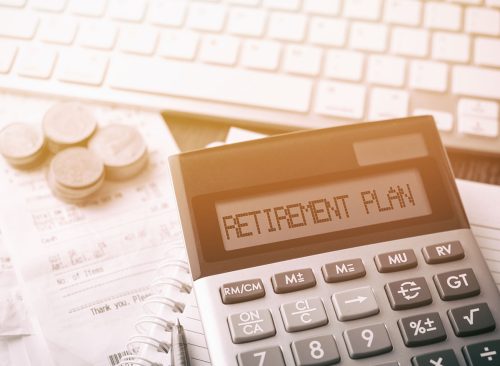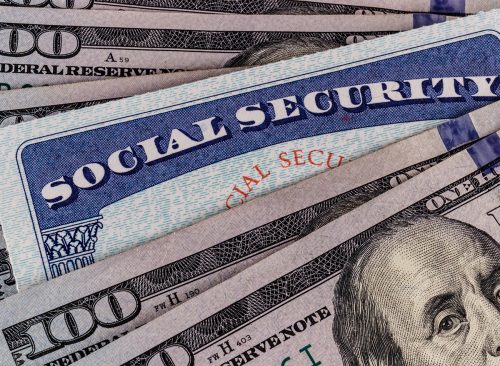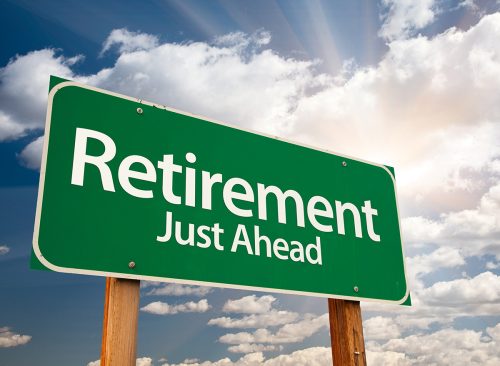Retirement on $46,000 a Year? Here’s How to Make It Happen
How to start saving for your golden years.

People spend their lives working hard and dreaming of the day when they can retire and enjoy their golden years, but according to the United States Department of Labor, “Only half of Americans have calculated how much they need to save for retirement.” Planning for retirement is not an easy task but “the good news is that, according to the United States Census Bureau, the average retirement income is $47,620,” Dr. Ann Kaplan, finance expert and founder of iFinance tells us. “So if you are looking at a retirement income of slightly less than that, you are not far off the median.” We spoke to experts who give us their insight on how to live on $46,000 a year in retirement and ways to help save.

In order to save enough to retire on $46,000 a year, you should start saving as soon as possible. “One of the questions we often don’t ask ourselves (until it is too late) is what will I need to retire comfortably?,” Dr. Kaplan says. “Here is a snapshot: Your current income will be replaced by a budget of $21,924 per year received through Social Security Benefits . Of course, the age you retire at and how long you live following retirement will determine how much you will need, but, assuming the best, and back of a napkin, if you calculate you will need $46,000 per year to live on, you will need to save the difference $358K to top up your benefits.”

Living on a fixed income isn’t easy and many have to alter their lifestyle. “If you are close to retirement and have not saved for such, you may be facing a big lifestyle change,” says Dr. Kaplan. “But if you have saved, and considering the benefits, you can live on $46,000 per year. The question then becomes, what will your lifestyle be like on $46,000 per year?”

While $46,000 a year might not sound like a lot of money, you can get by planning accordingly. Dr. Kaplan says, “You can retire and live on $46,000 per year, even take a trip or two and even afford the benefit of relaxing in the hands of a masseuse now and then…but you will need to budget.” Living on $46,000 is doable, but it’s not always going to be easy. With $46,000, after you pay your expenses like food, utilities, healthcare, taxes etc, and with inflation being as high as it is, there is probably not that much left over to spend on other things,” Eric Mangold, Wealth Manager and Founder of Argosy Wealth Management explains. “Retirees are typically on a fixed income, so any increase in their expenses means less to go around in other areas (like vacations).”

Inflation can be problematic for retirees and make it more challenging to maintain that same standard of living. “When you set up your retirement income plan, ideally you will want to have as much of your fixed expenses like groceries, utilities, healthcare, taxes, mortgage, etc covered by guaranteed sources of income,” Mangold explains. “These sources can be things like social security, rental income, pensions, or annuity strategies. Then the next bucket of money should be a bucket that can keep pace or hopefully out-pace inflation. While that is harder these days with inflation where it is, it’s still a philosophy that helps your income to not erode.”

Most retirees have to really watch their money and be careful with their spending, but there are programs that help seniors. “If you’re already at retirement age and have to stretch your dollar, all is not lost,” Edward Nisanov, a business and tax advisor says. “There are opportunities for low cost or even freebies to tap into. Many grocery stores have discounts for members and others even offer senior discounts on certain items or on the entire purchase. There are leisurely events geared towards retirees such as cinema, theater, parks and museum discounts. Restaurants offer perks for retirees as well.” he adds, “If you are trying to make ends meet, low income housing is another option. NYC has lotteries for such apartments and other options for nursing homes and assisted living facilities. Realizing that you may not have enough to retire on is not the end – it’s important to address it and start saving as early as possible.”

“It is never too late to start saving if you want to make your dream a reality,” Dr. Kaplan emphasizes. “In general, people should start saving for retirement when they first start working. Although retirement seems far off at such a young age, it can be a mindset that becomes a way of life. Saving early will also ensure you have enough to live on in later years. As a rule of thumb, by age 50, you should have six times your salary in your account and by 60 you should have 8 times your savings in your account.”

A common mistake many make is not saving enough to cover the fun things to do in retirement like travel. “Travel is considered a luxury when it has not been budgeted for,” Dr. Kaplan says. “Other things we take for granted, such as a trip to the spa or hair color, will also become a consideration when income is fixed. Ultimately, there will be decisions to make. If there is a fixed budget it will come down to choices.” She adds, “What you do with your retirement income will be determined by what your cost of living is, whether you have a partner (and their income too) and what you prioritize. If your overhead is nominal, meaning you are not paying rent or a mortgage and you are careful, you will have the benefit of travel and some other luxuries.”

Financial experts agree that the earlier you start saving, the better you’ll be set up for retirement. “It’s never too early to start saving for retirement, but the earlier you start, the better. Lance Belline, Financial Advisor and Author of More Wealth, Less Taxes says. “Ideally, people should start saving for retirement as soon as they start earning income. Here are some reasons why:
- “Compound interest: The power of compound interest means that the earlier you start saving, the more time your money has to grow. Even small contributions can add up significantly over time, thanks to the compounding effect.
- Longer time horizon: Starting to save for retirement early means you have a longer time horizon to reach your savings goals. This can help you weather market fluctuations and take advantage of long-term investment opportunities.
- Flexibility: Starting to save early gives you more flexibility in terms of how much you need to save each month. By starting early, you can save smaller amounts over a longer period of time, rather than having to make larger contributions later in life.
- Retirement uncertainty: With the future of Social Security and pension plans uncertain, it’s important to take control of your own retirement savings. Starting early gives you more time to build a nest egg that can support you in retirement.
- Health concerns: As people age, health concerns may arise that can make it more difficult to work and earn income. By starting to save for retirement early, you can help ensure that you have enough savings to support yourself if you need to retire earlier than planned.”

If you’re approaching retirement age and don’t have much saved, don’t panic! But you do need to jump into action. “My first recommendation would be to review your current monthly expenses – rent, utilities, food, leisure, etc. Then, compare it to your anticipated retirement income,” Nisanov advises. “Request employer 401(K) statements, review your IRA’s as well as your social security projected benefits. One fantastic tool is the SSA.gov website. There, you can see what your projected retirement benefit is and how retiring early or late (62 or 70) may impact your monthly check. If you can afford to begin claiming social security benefits at a later age, do so, as the check will be more significant.” Nisanov also recommends starting to start saving immediately. “Once you have your expenses and income sorted, see what the shortfall is and begin saving right away. Put aside a fraction of your paycheck (10 – 50% depending on the shortfall). Speak to a financial expert to see how you can make your money work for you through savvy investing (low index mutual funds for example).”

Many Americans trade in a 9 -to- 5 job for a more flexible schedule that offers freedom, but with no health insurance or retirement packages from employers. However, there are ways to still save for your later years. Mangold says, “for independent contractors or gig workers who aren’t covered by a company-sponsored retirement plan like a 401(k), they can consider a Simplified Employee Pension or SEP IRA or a Solo(k) which is a 401(k) made for individuals. These plans are typically easy to set up and run, and allow one to save for your own retirement.”
Belline also explains how the four following steps can help freelancers to get a comfortable retirement:
- “Individual Retirement Accounts (IRAs): IRAs are a type of retirement account that individuals can open and contribute to on their own. There are two types of IRAs: traditional and Roth. With a traditional IRA, contributions are tax-deductible, and taxes are paid when you withdraw the money in retirement. With a Roth IRA, contributions are made with after-tax dollars, but withdrawals in retirement are tax-free. Both types of IRAs have contribution limits, but they are generally lower than 401(k) limits.
- Simplified Employee Pension (SEP) IRA: A SEP IRA is a type of IRA designed for self-employed individuals or small business owners. It allows you to contribute up to 25% of your net earnings from self-employment, up to a certain limit. Contributions are tax-deductible, and taxes are paid when you withdraw the money in retirement.
- Solo 401(k): A Solo 401(k) is a retirement plan designed for self-employed individuals or business owners with no employees other than a spouse. It allows you to contribute as both the employer and employee, up to a certain limit. Contributions are tax-deductible, and taxes are paid when you withdraw the money in retirement.
- Taxable investment accounts: While not specifically designed for retirement savings, taxable investment accounts can be a good option for those who have maxed out their IRA or Solo 401(k) contributions. These accounts allow you to invest in a variety of assets, and while you will pay taxes on any gains, there are no contribution limits.”

There’s several ways to save up and invest to ensure you’ll be financially stable after leaving the workforce. Belline says, “Investing in real estate can be a good way to diversify your retirement portfolio. Rental properties can provide a steady stream of income in retirement, and the value of the property can appreciate over time. However, real estate investing can be complex and requires careful consideration and planning.” He also suggests annuities, and explains, “an annuity is a contract between an individual and an insurance company that provides a guaranteed stream of income in retirement. Annuities can be a good option for those who want a guaranteed income stream in retirement, but they can also be expensive and complex.”

If you’re relying solely on your monthly social security income for retirement, Nisanov says to rethink that idea. “Many people live for the moment and feel that their social security benefits, pensions/employer retirement plans and whatever they have saved will be enough to retire on. However, that may not always be the case. Life happens, emergencies happen, inflation happens and when the unexpected does occur, it could be a curve ball that throws off your retirement plans. For that, you want to make sure that you have more than less.”

While it’s recommended to start saving for retirement early, even for “folks who are in their 20’s and 30’s,” Mangold says, many don’t until much later. “It’s not uncommon for people to start thinking about retirement later than they should. Is it recommended? Not at all. That’s why it’s very helpful for people to find out how much income can be generated in retirement and how much money is going out the door in expenses. If more money is coming in the door than going out, that’s a good sign they are on the right track, but there is still work to do. If you are 10 years away or sooner away from retirement, you should make this a priority.” Dr. Kaplan adds, “Many people do not plan, simply because they are focused on the here and now. It is always one of two things, either it is too soon or it is too late. We trick our minds (and our wallets) into believing it is never the right time. We are trying to manage our expenses and prioritize what little extra that we have to enjoy in the here and in the now. In essence, when we realize the cold financial endgame called “retirement” that we did not plan for, we can find ourselves in a bit of a mess.”














